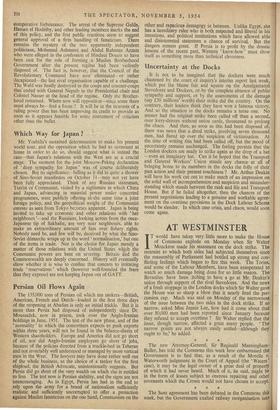AT WESTMINSTER
IT would have taken very little more to make the House of Commons explode on Monday when Sir Walter Monckton made his statement on the dock strike. The restraint to which both sides had subjected themselves since the reassembly of Parliament had bottled up strong and con- flicting feelings which began to fizz this week. The Tories, and some of the Labour Members, have been exasperated to watch so much damage being done for so little reason. The Bevanites have been itching to have a go at Mr. Deakin's union through support of the rival Stevedores. And the news of a fresh stoppage in the London docks which Sir Walter gave the House was so sharp a blow that it nearly fired the per- cussion cap. Much was said on Monday of the narrowness of the issue between the two sides in the dock strike. If so narrow, asked Miss Jennie Lee, how had it come about that over 80,000 men had been reported since January because they refused to accept overtime ? Sir Walter replied that the issue, though narrow, affected a great many people. 'The narrow points are not always easily settled—although they ought to be,' he added.
* * * The new Attorney-General, Sir Reginald Manningham- Buller, has told the Commons this week how embarrassed the Government is to find that, as a result of the Morelle V. Waterworth judgement in the Court of Appeal (the Waters case), it may be the legal owner of a great deal of property of which it had never heard. Much of it, he said, might be in the form of leases subject to onerous repairing and other covenants which the Crown would not have chosen to accept.
* * * The Suez agreement has been debated in the Commons this week, but the Government exalted railway reorganisation into the chief business by arranging debates in both Houses—on Monday in the Commons and on Wednesday in the Lords. A former signalman, Mr. David Jones, who sits for the Hartle- Pools, wound up for the Opposition and announced that Labour reserved the right to vote against the reorganisation scheme later on if the proposed area boards were not cut out. He made this warning sound like the gravest threat ever hurled at the Government. But Mr. Boyd-Carpenter, who replied, did not quail. He was determined to be conciliatory, and indeed this was not difficult in a House that was half asleep. J. F. B.



































































 Previous page
Previous page